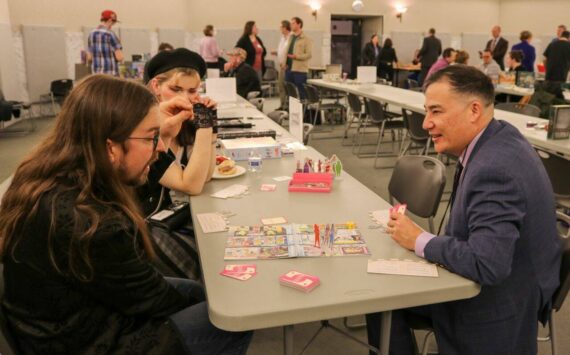Washington state’s community and technical college system kicked off its 50th birthday celebration last week when Gov. Jay Inslee proclaimed April 3 as Community and Technical College Day.
It was 50 years to the day that former Gov. Dan Evans signed the 1967 Community College Act creating the state’s unified two-year college system. The act changed the landscape of higher education in Washington by opening the door to a college education to everyone in the state.
At the state’s 34 two-year colleges, students can train for specific careers, earn credits to transfer to four-year universities at less cost, and update their skills and knowledge. Tuition for a state resident is $3,852 per year.
Evans launched the proclamation-signing event by recalling a tug-of-war that went into creating a comprehensive community college system and an independent governing board now known as the State Board for Community and Technical Colleges.
In 1967, 22 community colleges already existed and were serving about 74,363 students. However, the so-called “junior colleges” were part of their local K-12 school districts. The 1967 legislation knitted them together under a unified system and with clearly defined college district boundaries and a state-wide vision. A 1991 amendment brought the state’s technical colleges into the system.
Today, Washington state is home to 34 community and technical colleges which serve about 381,000 students.
“It’s a pleasure celebrating what is one of the most magnificent acts of leadership in the governor’s post,” Inslee said of Evans. “I get the enjoyment of seeing lives changed with one of the most flexible, efficient, user friendly, always-there institutions in state history, which is our community and technical colleges.”
The 1967 legislation required colleges to offer an open door to every citizen; offer thoroughly comprehensive education, training and service programs; and allow for growth, improvement, flexibility and modification of programs. The act also encouraged colleges to be efficient in their operation while being creative and imaginative as they developed new education, training and service programs.
“We’ve been here for the people of Washington through huge economic changes and innovations over the past 50 years. We’ve always met the real needs of people in real time” said Shaunta Hyde, chair of the State Board for Community and Technical Colleges. “We kept our promise back then; we’re keeping it now. We definitely look forward to the next 50 years.”
The first college to open its doors was in Everett, which began in 1915 with 42 students. It closed in 1923 for lack of students. Two years later, Centralia College opened and is now the oldest continuously operating community college in the state.
Community and technical college system facts:
Over 4 million students have attended a Washington state community or technical college since 1967
Nearly 6 out of 10 full-time equivalent students in Washington state public colleges and universities are enrolled at a community or technical college
40 percent of public four-year university graduates in Washington state start at a community or technical college
Washington state community and technical college transfer students make up 47 percent of business majors, 46 percent of health field majors, and 35 percent of science, technology, engineering and math fields
Community and technical colleges and their current and former students add $20.5 billion to the Washington state economy each year
About the Washington State Board for Community and Technical Colleges:
The State Board for Community and Technical Colleges is led by a Governor-appointed board and provides leadership, advocacy, and coordination for Washington’s system of 34 public community and technical colleges. Each year, about 381,000 students train for the workforce, prepare to transfer to a university, gain basic math and English skills, or pursue continuing education. Visit our website at SBCTC.edu.
– State Board for Community and Technical Colleges








